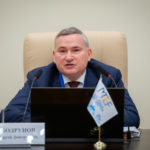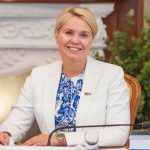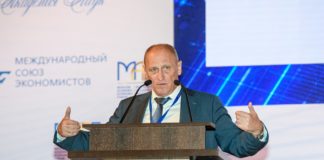Taking into account the task set by the President of Russia (Message of the Federal Assembly of the Russian Federation 02.21.2023) of constructive participation in the development of issues of reforming economic education, taking into account new requirements for specialists in economics, the VEO of Russia and International Union of Economists (IUE), in close contact with the RAS, the relevant committees of both chambers of our parliament, organized a wide a multi-stage all-Russian discussion about the content and possibilities of economic education reform in the country, taking into account the challenges and tasks facing Russia in the new geopolitical-economic reality.
Based on materials from the All-Russian Meeting on the Reform of Economic Education, organized by the VEO of Russia and the International Union of Economists
Experts:

Sergey Dmitrievich Bodrunov,
President of the VEO of Russia, President of the International Union of Economists (IUE), Corresponding Member of the Russian Academy of Sciences (RAS)

Ekaterina Vladimirovna Kharchenko,
Deputy Chairman of the State Duma Committee of the Federal Assembly of the Russian Federation on Science and Higher Education, member of the Board of the VEO of Russia, Doctor of Economics, Professor

Sergey Yurievich Glazyev,
Member of the Board (Minister) for Integration and Macroeconomics of the Eurasian Economic Commission (EEC), Vice-President of the VEO of Russia, Vice-President of IUE, Academician of RAS

Abel Gezevich Aganbegyan,
Head of the Department of Economic Theory and Politics, Faculty of Finance and Banking, RANEPA under the President of the Russian Federation, Academician of RAS
Bodrunov: The first thing I would like to dwell on more in detail is the content of educational programs, or more precisely, the need to update them. The world is changing rapidly. Globalization provided, among other things, by the scientific justification of the economic mainstream of the late 20th — early 21st centuries, is being replaced by other processes: the so-called glocalization, reglobalization, etc. Russia found itself in a qualitatively new international situation. A deep restructuring of the economy began in the country. We are finally moving away from market fundamentalism, which has dominated for decades, myths of post-industrialism. There is a humanistic turn towards increasing the level of socialization and building a socially oriented state, towards prioritizing traditional values. Meanwhile, economic theory and economic education in our country remain fundamentally the same as in the crisis years of the 1990s. Their basis remains neoclassical theory, micro- and macroeconomics, with the addition in some cases of new institutionalism. But the economy of the 21st century is far from just a market. Moreover, is it a market at all or something else? What are the interests and real needs of people today and what are the modern and promising mechanisms for satisfying them? And it is increasingly clear that economists need to think not only about profit and cost indicators, but about the interests of the country and the individual.
Russia obviously needs to create an economic education that reflects the changes taking place. Until we form a powerful cohort of new economists, armed with systematic knowledge in the field of economic theory, including heterodox economic theory (in particular, the foundations of classical institutionalism and political economy), we will not have an objective analysis of economic reality (and its reflection in public space), nor the new economic policy.
Second. The demand of the labor market is what is fundamentally important. According to Rosstat data at the end of 2022, a third of Russians are in a qualification hole — that is, they work outside their profession. There are even more people who do not work according to their skill level. We need to reduce the gap between the personnel needs in the labor market and the structure of training future economists, develop modern forms and methods of combining economic education with science and practice, a mechanism for targeted training, build a system for planning regional personnel needs, update educational programs taking into account the requirements of the business sector.
Third. It is equally important to expand educational courses in economics by including basic knowledge of economics in programs for students in non-economic specialties. In my opinion, the maximum economic effect is achieved where specialized specialists, executives, and managers with a fundamental economic education work.
And finally, fourth. Present here is a wonderful specialist Oleg Nikolaevich Smolin, who wrote a fundamental work, the main idea of which is education “throughout life.” Economic education should also begin with the school curriculum. Of course, students of both primary and secondary schools receive a certain amount of economic knowledge in the lessons of mathematics, computer science, the environment, social studies, and geography. But they receive it — unsystematically, and mostly — outside the context of the tasks that are relevant for our country. I am sure that the block on economics within the large school discipline named Social Studies should be especially seriously expanded.
Kharchenko: The transition to the education system that is beginning nowadays has its focus primarily on quality. Now, at various expert and professional meetings there are many discussions about the duration of training, about models of the educational process, about how should be outlined bachelor’s and master’s degrees being under large transformation now. But the most important thing is that the federal executive authorities, legislators, and the expert and professional community understand that the focus should be on the quality of the educational process, on its practical orientation.
The pilot project, which has now been launched, involves 6 significant universities in the Russian Federation:
Federal State Budgetary Educational Institution of Higher Education «Immanuel Kant Baltic Federal University».
Federal State Budgetary Educational Institution of Higher Education «Moscow Aviation Institute (National Research University)».
Federal State Autonomous Educational Institution of Higher Education «National Research Technological University MISIS».
Federal State Budgetary Educational Institution of Higher Education «Moscow State Pedagogical University».
Federal State Budgetary Educational Institution of Higher Education «St. Petersburg Mining University».
Federal State Autonomous Educational Institution of Higher Education «National Research Tomsk State University».
In order for this system to work, it is necessary to make changes to the constitutional laws and to a huge number of regulations, including local documents. The experiment will last 3 years.
To evaluate the implementation of the pilot project, three main requirements will be applied. The main one of which is the high level of the professor. As part of parliamentary control, we will pay special attention to reduce the bureaucratic burden so that the students will be more important than writing curriculum plans, work programs and other documents so that there is time to teach. Secondly, this is the quality of students, the level of their preparation at the level of general education. There is a lot of work to be done here to improve the qualifications of teachers, popularize education and popularize mathematics and physics education. And the third criterion is the quality of educational content. We must emphasize practical orientation, but at the same time we must not lose the balance between the fundamental nature of higher economic education and its practical orientation.
To transform the criterion of targeted training, a law was adopted on its new model, which is now in a very tight mode of the Ministry of Education, the Ministry of Digital Development and the Ministry of Labor, finalize the platform that integrates such digital platforms as Work in Russia, the Ministry of Labor, State Services and Enroll in a University Online. This year the law was not launched because everything needs to be regulated in order to provide a transparent mechanism for its implementation throughout the country, so that the applicant, the university and the employer can find another instrument on a competitive basis. And here we descend again to the level of school education and talk about the need to strengthen educational work within the framework of career guidance so that schoolchildren consciously make a choice of profession, including in economic areas of training.
What needs to be done to transform the economic education system? Those colleagues who have extensive experience in the higher education system remember the old forms of educational and methodological associations and remember the presence of exemplary educational programs. Now that we have moved to a competency-based approach, we have lost the principle of “know, be able, master” — what was previously written in work programs, and those exemplary educational programs, including indicative work and technological plans. Currently, the country is implementing 2,200 educational programs for each UGSN (enlarged group of specialties and land training) under line 38.00.00 “Economics and Management”. When students want to transfer from the Financial University to the Higher School of Economics or vice versa, they have to pass 30 more disciplines in the third year due to changes in work and curriculum. What kind of uniformity in the educational space can we talk about?
At the moment, there is no unified federal list of textbooks and teaching aids for use in higher education. And, of course, it is necessary to involve expert and professional communities and scientific institutions to the maximum. The goal of creating a methodological foundation for a unified educational space and forming a seamless ecosystem of higher education from school to postgraduate training is to institutionalize and systematize the functionality of educational institutions, in particular in the area of “Economics and Management.” Federal educational and methodological associations can act as an expert platform for coordinating the process of modernizing the new generation of federal state educational standards in economics, analyzing draft lists of specialties and areas of higher education training, and introducing mechanisms that will ensure the development of exemplary educational programs for higher education.
When developing the fourth generation federal state educational standard, we need to take into account the possibility of obtaining several qualifications. We must develop a concept for teaching economic disciplines; we already have experience with a concept for teaching history, a methodological foundation so that all teachers can take it as a basis and use it in the educational process.
Glazyev: The fundamental disciplines in our universities do not make any sense for the practical task of training specialists in the field of Eurasian economic integration. And this is a living, real process in which tens of thousands of people participate. Mechanistic approaches, which the mainstream of our economic theory is guilty of, not only do not help, but they even harm from the point of view of training specialists.
I’ll give you a living example. An adviser to one of the prime ministers of the EAEU states, who had just graduated from the London School of Economics and Political Science (LSE), approached me and said: “Can you imagine, everything we were taught is of no use. In general, everything is different, this is not the same economy. My professor talked to me two or three times, but now he doesn’t pick up the phone, he can’t explain what I should do.”
Unfortunately, we are now repeating this in our universities. If students take seriously the theories of the mainstream, macro- and microeconomics, then they cause enormous harm in the management system, as we see in our Central Bank, for example, where they use models that are absolutely inadequate to reality, which economic practice rejected 40 years ago. They continue to rely on mechanistic models of Phillips curve equilibrium and seriously believe that inflation and unemployment have cause-and-effect relationships. I’m not even talking about the idea of pricing, how inflation works, and the like, which is completely divorced from reality.
Our new textbook “Eurasian Economic Integration. Theory and Practice” give the theory of scientific and technological progress, the patterns of change in technological and world economic structures, which reveal the cause-and-effect relationships of the transformations taking place today. In addition, we used the philosophical and historical prerequisites of Eurasian integration. It would seem that the topic of our heritage of Eurasian philosophers is divorced from economics, but pay attention: when today the Chinese government declares its integration project “One Belt, One Road”, it seriously says that it wants to unite peoples into a human community of a common destiny. What does this have to do with economics? But it turns out that there is a direct interrelation, because the ideology of integration, coordination of interests and preparation for the implementation of projects where these interests are connected, where a synergistic effect is achieved is a real management task that needs to be worked on using the functionality of the Eurasian Economic Commission.
It seems to me that, based on these small examples from practice, we need to draw a simple conclusion that economics as a subject of study and explanation in the teaching process requires an interdisciplinary approach. Reducing the teaching of economics to a narrow group of disciplines, beautiful in theory, but inadequate in practice, prepares dogmatists who are unable to understand real economic processes and, even more so, unable to manage them, as we see in the example of a large number of erroneous decisions in our macroeconomic policy.
For example, some economists defend with militant dogmatism absolutely anti-scientific approaches such as inflation targeting by real instruments. Medicine was not a science until it reached the molecular level, until scientists understood the cause-and-effect relationships and processes occurring in living organisms at the cellular level, until molecular biology was equipped, and now it got to bioengineering. Only now we have a medical understanding of how the physiology of the body works, and from this immediately follows a huge number of new techniques that are much more effective and ensure the extension of human life to 100 years.
And our economic science, I mean its mainstream, and the education system are akin to medieval medicine, where the main recipe for any disease is bloodletting. Our monetary authorities are doing exactly this. When it seems to them that inflation is high, they raise interest rates and reduce the money supply, that is bloodletting in essence. They open the export of capital so that there is less money in the country. And such doctors, who worked in medicine 200 years ago, today lead our economy, relying on dogmatic ideas, which in turn they learned from mainstream textbooks.
Continuing this analogy, I can say that, of course, medicine would not be able to ensure an increase in human life expectancy on average from 30 years 200–300 years ago to 80 years now in developed countries if it remained at the level of bloodletters. Likewise, our economy cannot ensure economic management, cannot ensure economic development, if the government bodies regulating the economy employ people who do not understand the real laws of economic development.
Therefore, if we want to prepare specialists who are able to understand and manage, they must know the laws of scientific and technological progress, the foundations of social psychology, the features of innovation processes, the dialectics of the interaction of production forces and production relations.
And finally, I’ll touch the integration of the economic education system. When I first went on a business trip to Harvard Business School, I was surprised to discover that managers in America are not taught economic theory at all. These are two completely different topics. Economic theory is taught to people who then work as professors in universities, but businessmen are taught in a completely different way, using different methods, using all kinds of cases, understanding psychology, people’s motivation, and the like. We need, it seems to me, taking into account both our sad experience and foreign problems, to talk about preparation, the development of a unifying integration model of economic education, where, perhaps, not everyone needs to know some areas that are necessary for a deep understanding, but, at least rely on a common paradigm.
Aganbegyan: In terms of the level and quality of education, our country occupies a fairly high place — 29th and 35th, respectively. This is higher than Italy, France, all the BRICS countries, a worthy place in the world. Although, when we launched the satellite, according to the analysis of the US intelligence services, the reason for their loss was that the education system in Russia was better than in America. This is the main conclusion they made. And President Kennedy then said that Russia defeated America in space at a school desk. At that time we occupied a leading place in the world in education. At that time, 11% of national income was spent on education compared to 4% in the USA. Since then we have been moving backwards in the ratings. So far we have dropped to 29th and 35th places, and as a percentage of the gross domestic product, education in Russia ranks, according to various ratings, from 100th to 120th place in the world with a little more than 4%, of which government spending is approximately 3.7%.
Another characteristic of education is its effectiveness. What results does this level and quality lead to? Do people who have received education know how to use it effectively and achieve high productivity, efficiency, and results? And here we look really bad in the world. Despite our high knowledge, we are more than twice as far behind Italy and France in labor productivity, and in other efficiency indicators we are also very far behind.
Therefore, our first task is to regain one of the leading places, well, at least in the top ten, in terms of the level and quality of education. To do so, it is necessary that this education be given by more qualified people. We have a very low level of teachers at school. They receive very low wages. In 2023 the average is only 45,787 rubles, with the average salary in the first quarter of 2023 in Russia being 59,340 rubles. We are one of the few countries in the world where teachers are paid below average. And not all teachers have a real higher education; you can become a teacher with either a three-year or a four-year degree. The process of improving the qualifications of teachers is poorly done; teachers are overloaded. Many of them, in order to earn money, work at one and a half times the rate. And you understand that the average is not the median. 75% of teachers (I’m citing official statistics) have salaries up to the level of average teachers, that is, the median is less, that is, we need to sharply raise teachers’ salaries: not only in schools, but also in secondary vocational schools and universities.
At the same time, it is extremely important for universities to integrate higher education institutions with science, which has not been done. Many scientists teach at universities, but this is not integration. Integration is when universities and research institutes work together precisely as institutions, in close connection, where students undergo internships, work part-time while studying, both at the research institute and on their equipment, which, of course, is a way higher and better, than in higher education institutions.
But the most important problem is the extremely low efficiency of education. Where do we have the highest salaries of any industry? Without regional coefficients and northern benefits, the highest salary in Russia is in the financial sector. One million one hundred thousand people work in specialized financial institutions. Their average salary is 132,000 per month, only the oil industry has higher wages, but this is due to regional coefficients and northern benefits.
At the same time, the most primitive branch of our economy is the financial sector: monetization is the most questionable topic, and the share of banking assets is three times lower than even in China, where the share of investments in the gross product is 17%, plus housing financing from investment funds is 14%. As a result, from 25 to 30% of investments go into the country’s economy; in China 18% of 43% of investments go into housing. In China, the level of average housing security has already surpassed ours. Not to mention the financing of innovation, it is ten times lower than abroad. The volume of non-bank funds is 20% of GDP in Russia, while in Europe it is 120%, in America — 200%. With this simply incomparable data from our financial system and foreign ones, the salary in the sector is huge.
How many people work in our Central Bank? Two times more than in the Federal Reserve, where they have 9 times more money. Three times more than in the Bank of England, and England is the World Financial Center with incomparable money circulation on the exchanges, 10 times larger than ours in terms of capitalization. Therefore, our economic education unfortunately does not produce results.
Our mathematics is the best in the world, but India provides the USA, Japan and Europe with 190 billion in mathematics programs. The world’s top IT hub, where unicorn firms are most successful, is Bangalore in India, where 8 million people work primarily in the information business. Where are we? Our exports are $10 billion. Our entire information activity is 20 billion, and if we take the transfer of data, telephones, and so on, we get 30 billion. Just completely unmatched numbers.
The fact is that knowledge is one thing, skill is another. No matter what kind of knowledge you give to the driver, he won’t drive a car without an internship, he’ll still do well in all your exams, and you can train him on the simulator as much as you like, but he can’t get behind the wheel until he drives for 40 hours.
Do people think that managing a workshop, or being a foreman, or managing a construction site is easier than driving a machine, perhaps? It is enough to simply teach, read, conduct seminars, take exams, and he is a ready-made specialist. No. He was not taught the ability to apply this knowledge. We don’t have this training. We don’t have an internship, and in the West you won’t be given a diploma without an internship. If you want to teach a foreign language at school, a bachelor’s degree is sufficient; if you want to teach in high school, you need to get a master’s degree, but you won’t be given a diploma — you must first complete 305 hours of classes in some leading school under the guidance of its best teachers, and only after that you pass such certification will you receive a diploma.
In many specialties, US degrees are not issued until you have worked for several years in positions that will provide you with experience. A higher education is not enough to teach, for example, a foreign language in a public school. In America there is a special degree. For example, SPA (chartered accountant). You can become a director or chief accountant in a large company without an SPA. This is 2 years of study, 4 exams of 4 and a half hours each. 15% of applicants pass it. You can understand what kind of exams these are. Their financial director’s knowledge is completely incomparable with ours, and neither are the chief accountants. We need to think about how to adopt this Western system, how to include educational skills. As for financing, we need to set some goals. At least 6% for education by 2026 and at least 8% of the gross product for education by 2030.



